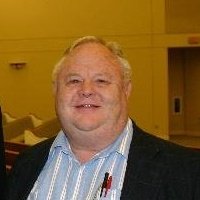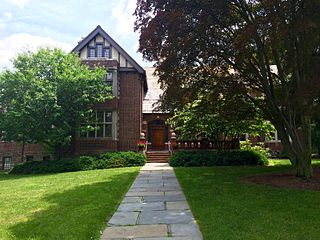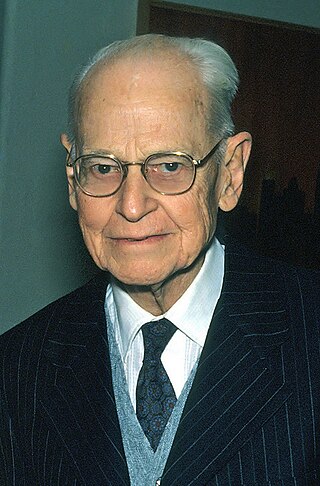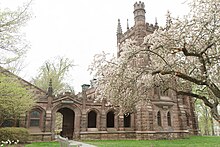
Princeton University is a private Ivy League research university in Princeton, New Jersey. Founded in 1746 in Elizabeth as the College of New Jersey, Princeton is the fourth-oldest institution of higher education in the United States and one of the nine colonial colleges chartered before the American Revolution. The institution moved to Newark in 1747, and then to the current site nine years later. It officially became a university in 1896 and was subsequently renamed Princeton University.
PEF, PeF, or Pef may stand for the following abbreviations:

Campus Club was one of the undergraduate eating clubs at Princeton University. Located on the corner of Washington Road and Prospect Avenue, Campus was founded in 1900. It was one of the eating clubs that abandoned the selective bicker process to choose members non-selectively, a status it held for over twenty years.

The Princeton Quadrangle Club, often abbreviated to "Quad", is one of the eleven eating clubs at Princeton University that remain open. Located at 33 Prospect Avenue, the club is currently "sign-in," meaning it permits any second semester sophomore, junior or senior to join. The club's tradition of openness is demonstrated as far back as 1970, when Quadrangle became one of the first coeducational eating clubs.

John Mcelphatrick Frame is a retired American Christian philosopher and Calvinist theologian especially noted for his work in epistemology and presuppositional apologetics, systematic theology, and ethics. He is one of the foremost interpreters and critics of the thought of Cornelius Van Til.
Inter-Varsity Christian Fellowship of Canada, or InterVarsity, is a Christian organization which ministers to youth and university students. It has a variety of ministries, including Pioneer Camps of Canada, high school, college and university ministries. InterVarsity Christian Fellowship/USA is the American branch of InterVarsity.

The Daily Princetonian, originally known as The Princetonian and nicknamed the 'Prince', is the independent daily student newspaper of Princeton University.
John Clement Whitcomb Jr. was an American theologian and young Earth creationist. Along with Henry M. Morris, he wrote The Genesis Flood, which influenced many conservative American Christians to adopt flood geology.

Nassau Weekly is a weekly student newspaper of Princeton University. Published every Sunday, the paper contains a blend of campus, local, and national news; reviews of films and bands; original art, fiction and poetry; and other college-oriented material, notably including "Verbatim," a weekly overheard-on-campus column.

The Two Dickinson Street Co-op, or 2D, is one of the five student dining co-ops at Princeton University in Princeton, New Jersey. 2D is a 50-member vegetarian cooperative located across the street from the Princeton University campus.

The Princeton University Chapel is a Collegiate Gothic chapel located on that university's main campus in Princeton, New Jersey, United States. It replaces an older chapel that burned down in 1920. Designed in 1921 by Ralph Adams Cram in his signature style, it was built by the university between 1924 and 1928 at a cost of $2.3 million. The chapel was rededicated in an interfaith ceremony in 2002 following a major two-year restoration.
Western Seminary is an interdenominational Evangelical Christian seminary with campuses in Portland, Oregon; San Jose, California; and Sacramento, California. Western Seminary also has online-only degrees and programs and provides non-credit classes through the Center for Leadership Development.

The Princeton Tory is a magazine of Conservative political thought written and published by Princeton University students. Founded in 1984 by Yoram Hazony, the magazine has played a role in various controversies, including a national debate about white privilege. Notable alumni include United States Senator Ted Cruz and Wendy Kopp, the founder of Teach for America. Four editors have gone on to be Rhodes scholars.

The James Madison Program in American Ideals and Institutions, often called simply the James Madison Program or the Madison Program, is a scholarly institute within the Department of Politics at Princeton University espousing a dedication "to exploring enduring questions of American constitutional law and Western political thought." The Madison Program was founded in 2000 and is directed by Robert P. George, the McCormick Professor of Jurisprudence at Princeton University.
The Princeton University Summer Journalism Program (SJP) is an all-expense-paid summer program at Princeton University for rising high school seniors across the country from low-income backgrounds. It was founded in 2002 by four former 'Daily Princetonian' editors. The founding directors include former editor-in-chief of The Daily Princetonian, Richard Just, former editor of The New Republic, Michael Koike '01, Gregory Mancini '01 and Rich Tucker '01.

The C. Bernard Shea Rowing Center is the boathouse for the Princeton University rowing programs. Located on Lake Carnegie in Princeton, New Jersey, the center consists of the Class of 1887 Boathouse and the Richard Ottesen Prentke ‘67 Training Center. The Shea Center was dedicated on October 7, 2000.

Stone Hill Church of Princeton is a gospel-centered, nondenominational church in Princeton, New Jersey, United States. The church was founded in 1956 as Westerly Road Church at the intersection of Westerly and Wilson Roads. In 2013, it constructed a new facility and relocated to 1025 Bunn Drive and changed its name to Stone Hill Church of Princeton. The Rev. Dr. Matthew P. Ristuccia, a member of the Princeton University class of 1975, served as senior pastor from 1985 until his retirement in 2020.

Donald B. Fullerton was a Christian missionary and teacher who founded the Princeton Christian Fellowship, called the Princeton Evangelical Fellowship until 2017, and served with it from 1931 until 1980. He was noted for convincing many students at Princeton University of what he saw as the truth of the Christian faith. Arthur Glasser also credited his conversion to Dr. Fullerton, through hearing him speak at the Keswick Bible Conference. In addition to his evangelistic efforts, Dr. Fullerton was a major spiritual influence on many students including Paul Pressler, a major figure in the Conservative resurgence of the Southern Baptist Convention, and the noted Reformed theologian John Frame. He was a member of the Princeton University Class of 1913 and received an honorary Doctorate of Ministry from Grace Theological Seminary.

P&R Publishing is an evangelical, Reformed, Christian publishing company located in Phillipsburg, New Jersey. P&R publishes books that promote biblical concepts and Christian lifestyle according to the Westminster Confession of Faith and Catechisms.
Joshua Timothy Katz is an American linguist and classicist who was the Cotsen Professor in the Humanities at Princeton University until May 2022. He is a scholar on the languages, literatures, and cultures of ancient and medieval history. Currently, he is a senior fellow at the American Enterprise Institute.

















